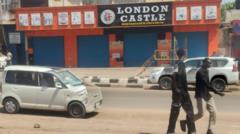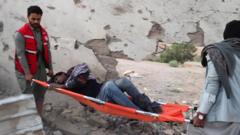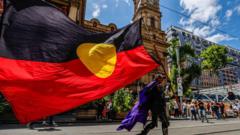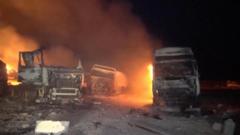After violent confrontations in South Sudan's capital, prompting a nightly curfew, three people have died and many more were injured in retaliation against Sudanese citizens. The unrest follows a humanitarian crisis in Sudan, with increased tensions spilling over into South Sudan.
Nightly Curfew Enforced in South Sudan Amid Rising Tensions and Violence

Nightly Curfew Enforced in South Sudan Amid Rising Tensions and Violence
A curfew has been imposed in Juba following violent revenge attacks on Sudanese nationals, resulting in fatalities and property damage.
Article Text:
Shops and restaurants were closed on Friday across much of Juba, South Sudan's capital, as tension escalated following a series of attacks on businesses and homes owned by Sudanese. In response to the violence, South Sudan's police chief announced a curfew from 18:00 to 06:00 local time to restore order.
Reports indicate that three individuals have died and seven others were injured during clashes involving security forces in both Juba and Aweil, another town in South Sudan. While the nationalities of the deceased have not been disclosed, it is confirmed that attacks have targeted Sudanese properties. In Aweil, three homes belonging to Sudanese nationals were set ablaze.
"Nobody will be allowed to roam the streets during curfew hours to safeguard public and private property," stated Insp Gen Abraham Manyuat Peter on Friday. Additional reports from police sources revealed that officers intervened to protect 45 Sudanese traders who had sought refuge at a police station in Juba.
Since gaining independence from Sudan in 2011 after a prolonged civil conflict, South Sudan has seen an influx of Sudanese nationals fleeing the ongoing humanitarian disaster triggered by the violent clashes between Sudan’s warring generals since April 2023. According to the UN, approximately 25 million people in Sudan are now facing urgent food and aid shortages, marking it as a global humanitarian catastrophe.
Recent graphic footage depicting alleged Sudanese soldiers executing South Sudanese civilians has surfaced, particularly from Wad Madani in Gezira State. Rights organizations report that at least 13 people, including children, were killed due to their ethnicity, highlighting a history of systemic racism against darker-skinned individuals in Sudan.
Outrage from the South Sudanese community—both local and in diaspora—over these videos incited hundreds of young men to target Sudanese-owned businesses in Juba and beyond on Thursday. Gunfire resonated throughout the city as security forces tried to maintain order, while young men took to the streets to flee police.
By Friday, major commercial establishments in Juba, including Konyo Konyo market—the largest in South Sudan—remained shuttered, with various restaurants also closed as business owners opted for precaution. Bread prices spiked by as much as 17% at local bakeries allowing limited business activity.
As police continue to trace and apprehend young men seemingly involved in the chaos, dozens have been dispatched to protect Sudanese nationals and their belongings in neighborhoods like Atlabara. Reports from Wau, South Sudan's second-largest city, also noted instances of unrest, with groups attempting to loot Sudanese-owned businesses before police intervened with warning shots.
In another part of the country, spontaneous protests erupted in Tonj town, the hometown of the presidency, marking a significant moment of unrest amidst the ongoing investigations and community tensions fueled by recent events.



















